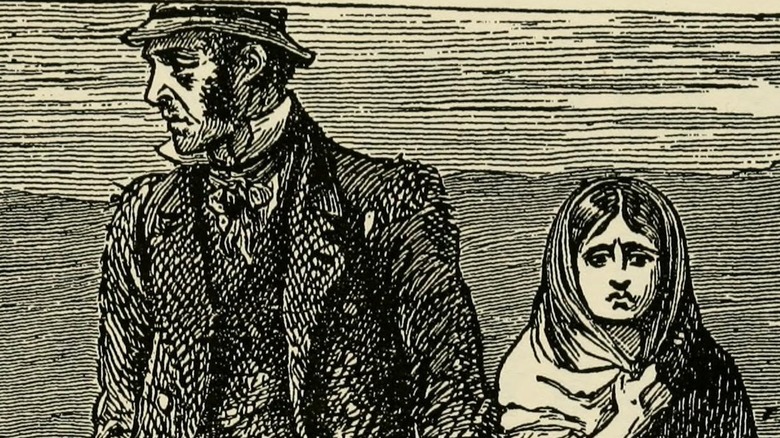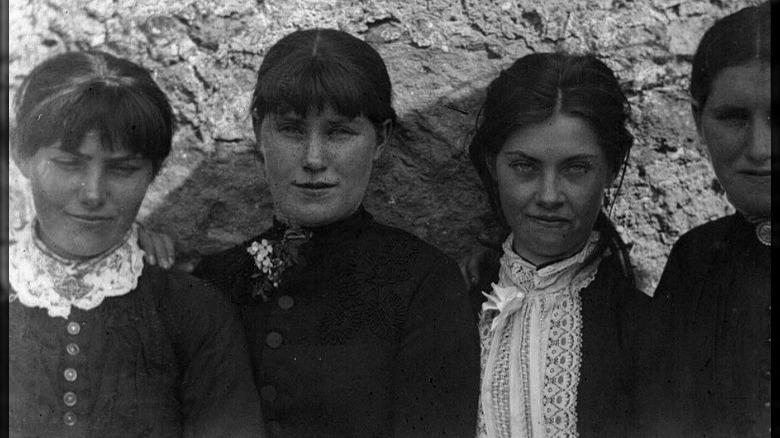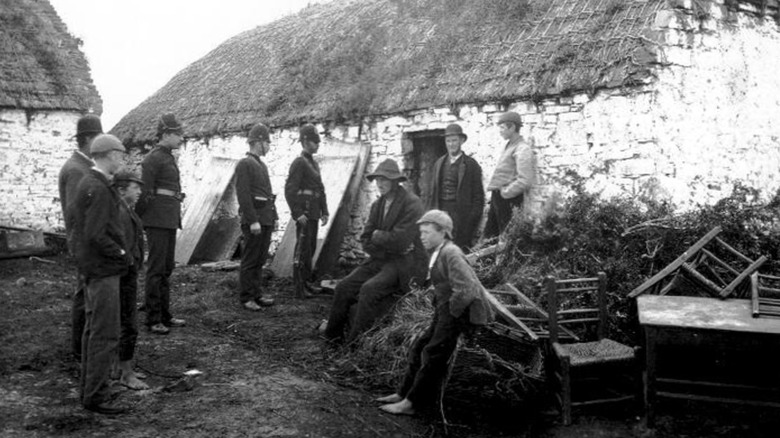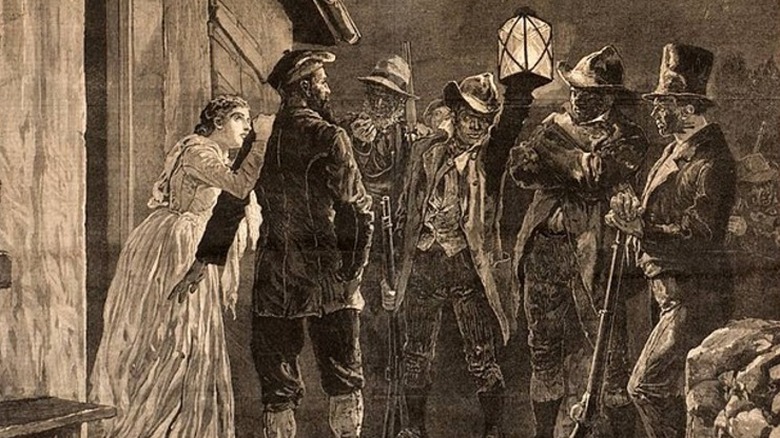Ireland's Land Wars Prompted A Single Family To Go To Battle Against The Police
All around the world, people are feeling the pinch. Many people are struggling to make ends meet. This story, from Ireland's vicious Land Wars, offers a tale of resistance and revolt against those who would make hard times even harder.
By 1887, Ireland was still finding its feet after the generational trauma of The Great Famine of 1845-49. The Land War, or Cogadh na Talún, was a series of bitter class struggles that pitted the rural peasant farming class against the landlord and absentee landlord classes (via Britannica). Following several spells of crop failures and severe economic depression in the late 19th century, many farmers were unable to pay their rent. Unconcerned, landlords raised rents without regard to what the farmer could pay or what the land could produce (per Irish Central). Whole districts were seized, atrocities were committed, and women and children were dumped by the ditch. Farmers, sick of being exploited, banded together and fought for their right to own the homes they built and the land they worked on. Tenant farmers resisted evictions, refused to pay their rent, and demanded that the ruling English Parliament rectify the inequalities plaguing the country (per Britannica).
Despite the victories from collective boycotting, the Land Wars saw occasional eruptions of violence. In astonishing displays of unity and defiance, the exploited peasant class rose up and bit the hands of their masters in fights, fires, and even the odd assassination (per ”Uncertain Futures,” via Oxford Press). One such episode was the epic stand of the O'Halloran family.
Enter the O'Hallorans
The O'Hallorans lived in a modest homestead southwest of Bodyke hamlet in County Clare, on Ireland's west coast. Three sisters — Honoria, Annie, and Sarah — and two elder brothers, Frank and Patrick — made up the O'Halloran family of seven. (Accounts differ; Herstoric Ireland places their mother, Harriet, in the home as well.) For two years, they came into constant conflict with their landlord, Colonel O'Callaghan (per Irish Central). O'Callaghan had wanted to raise the O'Hallorans' rent, but they took the matter to the Land Court and won. The outcome was that the rent would be reduced from what O'Callaghan had originally wanted. Despite this success, the O'Hallorans still owed two years' rent in arrears to the Colonel. This impasse would persist, with no signs of compromise arising from either party.
Eventually, the Colonel resolved to evict the O'Hallorans, giving them legal notice that they would be forced out by May 1887 (via The Irish Times). The O'Hallorans, on the other hand, had other plans and swore to defend their homestead to the bitter end.
In a fashion more akin to today's doomsday preppers, the O'Hallorans lost little time in preparing for a siege. Every member of the household pitched in to help build a stronghold in the weeks leading up to the eviction. Trenches were dug, windows and doors were barred, and pitchforks, wooden poles, and sandbags were collected (via Clare Library). Crowds from around the county flocked to Bodyke, eager to see how it was all going to end. On the morning of June 2, they would get their answer.
'Come Now, If You Dare'
Armed to the teeth with rifles, bayonets, picks, axes, crowbars, and shields, a motley crew of soldiers, bailiffs, police officers, and a priest came over the hill and arrived at the family farm, expecting an easy fight. The O'Hallorans, however, would prove to be more than a handful. As the bailiffs sniffed out the house, letting their curiosity draw them closer, the O'Halloran sisters dumped a boiling concoction of water to scald them. In response, police threatened to open fire on the family (via The Irish Times). Under the protection of shields and umbrellas, the attacking forces attempted to break down the windows and doors with crowbars, only to be met by the family raining roof tiles on their heads. Growing bolder, the O'Halloran girls beckoned their aggressors to ”Come now, if you dare” (via Herstoric Ireland).
Over the next 45 minutes, waves of police would be pushed back by the O'Hallorans. Eventually some of the attackers managed to scale the side of the house after being repelled multiple times. One bayonet-wielding officer suddenly burst through the window and attacked Honoria, before being overpowered and disarmed by Frank, who was determined to defend his sisters (via The Journal IE). The fighting reached a fever pitch and the possibility of death became real, so much so that the priest outside persuaded Frank against hurling a police officer out a window.
Inevitably, the bombardment of officers proved too much for the O'Hallorans, and their home was eventually comprised and they were overpowered. They'd fought as hard as they could, but the writing was on the wall.
The aftermath
At the behest of the priest, Father Hannon, the family surrendered. They were then arrested and carted off in custody to be charged with assault. In a bizarre twist of fate, most of the women were immediately released, while the others were sent to Limerick Jail to await their punishments.
When the judge's gavel dropped, and the verdict was read, the O'Hallorans had gotten away surprisingly lightly. Frank and Patrick got three months imprisonment and hard labor, while Honoria and Annie only got one month's prison time. Surprisingly, many newspapers across the nation lauded the "indomitable O'Halloran family" (per Herstoric Ireland).
They fought the law, and the law won. Despite the defeat, the O'Hallorans and other tenants throughout Ireland were eventually granted the right to own their land in 1909 (via The Irish Times). A 1911 census (via The National Archives of Ireland) shows that some O'Hallorans remained in the Bodyke area even after all of this hullaballoo. Therefore, one should imagine that the O'Hallorans were eventually able to purchase their land, losing the battle but winning the war. Today this oft-overlooked tale has left behind a legacy of a family unafraid to stand up to an unjust system. Frank O'Halloran's gripping testimony about the events, from an 1887 account by The Irish Times, is available at the Clare Library.



